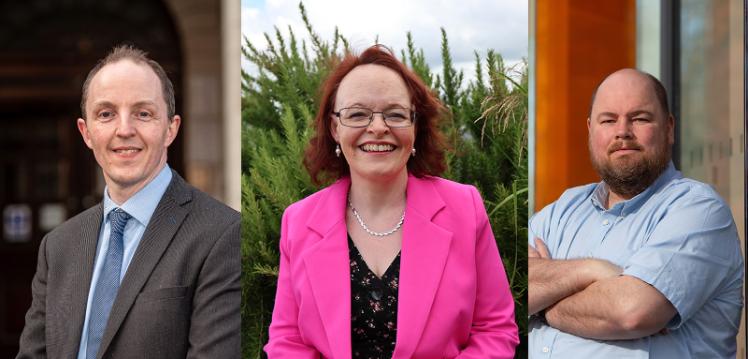Queen’s University Staff Recognized with Esteemed National Teaching Awards
The NTF Scheme, organised by higher education charity Advance HE, is a highly competitive scheme that recognises and celebrates individuals working in UK higher education who have made an outstanding impact on student outcomes and the teaching profession.
The 2024 recipients from Queen’s are Dr David Cutting, from the School of Electronics, Electrical Engineering and Computer Science; Dr Paul Hamilton, from the School of Medicine, Dentistry and Biomedical Sciences; and Dr Emma McKenna, Co-ordinator of The Science Shop at Queen’s.
Dr Emma McKenna’s career has been shaped by a desire to bring communities and universities together in fruitful collaborative relationships. Emma is passionate about building engaged research with communities into higher education, in particular into university teaching and has been working to develop research with impact and community engaged research and learning for over 25 years. Over this time, she has worked with hundreds of community groups, and thousands of students to design and deliver community engaged research projects.
She is also a leading member of the Living Knowledge Science Shop Network and has been a key architect in the community engaged research movement, developing policy and designing and delivering training and mentoring to universities across the UK, Ireland and Europe.
Speaking about receiving a Fellowship, Dr Emma McKenna said: “I’m delighted to have been awarded this National Teaching Fellowship. I’ve been lucky enough to work with, and learn from, a very wide range of knowledgeable and inspirational people in local communities across Northern Ireland, in the University itself and nationally and internationally.
“This award recognises the work we have all done together, and the value of community engaged research and learning for students and for university education.”
Dr David Cutting is a Reader (Education) in Computer Science at Queen’s. David is committed to increasing equitable access to technology, as he has seen first-hand the transformative power education and computing can have after working in sub-Saharan Africa with Voluntary Service Overseas. David is renowned for providing an inclusive and engaging learning experience that supports and challenges students, leading on innovative student support and success strategies, such as the pioneering use of engagement data during Covid-19 to provide targeted early-intervention support to struggling students.
David’s active research interests include how Software Engineers learn beyond formal study as they move into the workplace and start to learn from peers and managers, as well as how we can better understand the complex software systems that underpin the modern world.
Dr David Cutting said: “I am delighted and honoured to be awarded a National Teaching Fellowship. It is a wonderful recognition of the work we have done at Queen’s to help support student achievement and continually refine our teaching in the fast-moving field of computing. Personally, this award is a great professional achievement and will help to build my network of collaborators and showcase my work to a broader audience.”
Dr Paul Hamilton is a Clinical Reader, specialising in the discipline of Chemical Pathology. Paul has authored five medical textbooks, and collaborates with international colleagues in the production of high-quality educational resources for professionals across the globe. Paul is leading on the implementation of Case Based Learning in Queen’s Centre for Medical Education, an extensive and important collaborative initiative that uses authentic clinical cases to encourage students to learn in a holistic way about patient care. He is also currently investigating the effects of stress on learners in medical simulation environments, and collaborates with primary researchers in the fields of cardiovascular disease and sepsis.
Dr Paul Hamilton said: “I was absolutely surprised and thrilled to learn that I had been awarded a National Teaching Fellowship in recognition of my work in medical education. It has been a privilege to have been involved in the education of medical students and postgraduate trainees. It has always been my aim to help train doctors of the highest calibre who can in turn improve the health of the patients they go on to treat.
“In recent years, I have been heavily involved in the design of Case Based Learning for the new medical curriculum but my efforts in this, and in all other elements of my teaching, should very much be viewed in the context of the fantastic team in which I work. I am in the very fortunate position of being able to do a job that I love with people that I respect and value.”
Professor Judy Williams, Pro-Vice-Chancellor for Education and Students at Queen’s, said: “I am delighted to celebrate Paul, David and Emma’s achievement and that their expertise has been recognised nationally. This is a highly competitive award with only 55 National Teaching Fellowships awarded across the sector each year. It is testament to the high calibre of Queen’s teaching staff that we have received three of these awards.
“Our three Fellows have dedicated their careers to improving the lives of the students they teach and work with, and they all have used innovative ideas and engaging techniques to enhance learning and student success, and it is important that their hard work and dedication is recognised and celebrated.”

